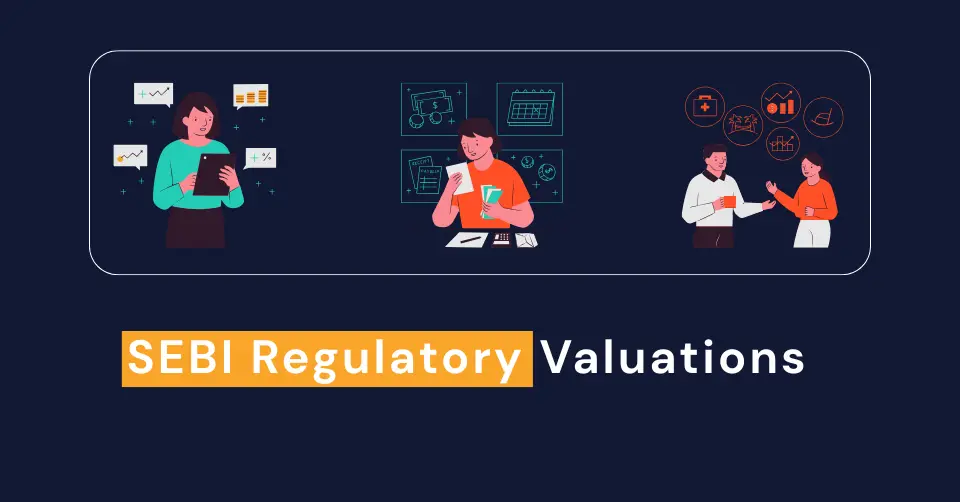
Valuation for FEMA / FDI Compliance | Equirium
October 9, 2025
ESOP Valuation under IND AS 102 & Income Tax | Equirium Analytics
November 23, 2025Table of contents
- Ensuring Fairness, Transparency and Compliance in Capital Market Transactions
- SEBI Valuation Framework - What You Need to Know
- When SEBI Valuations Are Required ?
- Accepted Valuation Methodologies
- Want to get your Business valued from IBBI Registered Valuer ?
- Regulatory Reporting & Use Cases
- Documents Typically Required
- How Equirium Analytics Adds Value !?
Ensuring Fairness, Transparency and Compliance in Capital Market Transactions
Valuations performed under SEBI regulations are essential to protect investor interests and preserve market integrity. Whether the requirement arises from a preferential allotment, merger, delisting, ESOP pricing, or an open offer, a SEBI-compliant valuation ensures that transaction pricing is fair, transparent and defensible.
At Equirium Analytics we prepare SEBI-ready valuation reports that align with applicable SEBI regulations and market practice. Our reports are drafted to withstand scrutiny from auditors, merchant bankers, regulators and investors.
SEBI Valuation Framework - What You Need to Know
SEBI’s valuation requirements are embedded in several regulatory frameworks, including but not limited to:
-
SEBI (Issue of Capital and Disclosure Requirements) Regulations, 2018 (ICDR)
-
SEBI (Listing Obligations and Disclosure Requirements) Regulations, 2015 (LODR)
-
SEBI (Substantial Acquisition of Shares and Takeovers) Regulations, 2011 (SAST)
-
SEBI (Delisting of Equity Shares) Regulations, 2021
-
SEBI (Share Based Employee Benefits and Sweat Equity) Regulations, 2021 (SBEB)
Depending on the transaction and the applicable regulation, SEBI may require an independent valuation prepared by an IBBI-registered valuer or by a SEBI-recognized category of merchant banker. The report must be transparent, methodologically sound and supported by verifiable data.
When SEBI Valuations Are Required ?
Common scenarios that typically require SEBI-compliant valuations include:
-
Preferential allotment or private placement by listed entities.
-
Pricing for IPOs, rights issues and QIPs when comparable benchmarks are needed.
-
Mergers, amalgamations and schemes of arrangement where valuation forms part of scheme documents.
-
Delisting transactions to determine the exit price for minority shareholders.
-
Open offers and takeover situations under SEBI (SAST) Regulations.
-
Buy-back and capital reduction exercises.
-
ESOP and sweat equity valuations for listed companies.
Engaging a qualified valuer early in the transaction planning helps avoid last-minute gaps and regulatory pushback.
Accepted Valuation Methodologies
SEBI expects valuations to follow internationally accepted valuation principles while being tailored to the transaction context. Commonly used approaches are:
1. Discounted Cash Flow (DCF) / Income Approach
Appropriate for companies with predictable cash flows or when future performance is central to value. DCF estimates future free cash flows and discounts them at a suitable rate.
2. Market Approach (Comparable Companies / Trading Multiples)
Uses valuation multiples of comparable listed companies or recent transactions to benchmark value. Particularly useful when relevant comparables exist.
3. Transaction (Precedent) Multiples
Derives value from recent M&A transactions in the same sector, adjusted for time and business specifics.
4. Net Asset Value (NAV) / Asset Approach
Best suited to asset-heavy or balance-sheet-driven businesses where recoverable value is closely linked to tangible assets.
At Equirium Analytics we select the most appropriate method(s), provide rationale for method selection, and include sensitivity and scenario analyses to demonstrate robustness.
Want to get your Business valued from IBBI Registered Valuer ?
Regulatory Reporting & Use Cases
SEBI valuation reports often support the following documents and processes:
-
Disclosure and submission to stock exchanges and SEBI (where required).
-
Inputs to scheme documents, information memorandums and public filings.
-
Board / audit committee review and approval processes.
-
Pricing rationale included in investor communications and prospectuses.
Incomplete or poorly documented valuations can result in regulatory delays, additional queries, or requests for rework. We structure reports to anticipate common regulator and auditor questions.
Documents Typically Required
To prepare a comprehensive SEBI-compliant valuation report we typically request:
-
Latest audited financial statements (3 years if available) and management accounts.
-
Detailed shareholding pattern and cap table.
-
Transaction documents and proposed term sheets.
-
Management projections and business plan (for DCF-based work).
-
Details of comparable companies or precedent transactions.
-
Any prior valuations, fairness opinions or merchant banker notes.
Equirium Analytics assists clients in compiling and validating the documentation to reduce turnaround time.
How Equirium Analytics Adds Value !?
Equirium Analytics combines regulatory experience and valuation rigour to deliver reports that are both defensible and decision-useful:
-
Valuations prepared and signed by IBBI-registered valuers.
-
Deep familiarity with SEBI regulations, circulars and market expectations.
-
Robust financial modelling and transparent assumptions.
-
Clear explanation of valuation choices and sensitivity analysis.
-
Coordination with merchant bankers, legal counsel and auditors for seamless submission.
We focus on producing concise, audit-ready deliverables that reduce rework and accelerate transaction timelines.





